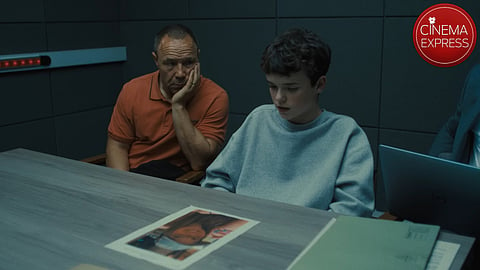

The first thing I did after watching Adolescence was call up my young niece, urging her to check it out immediately. The British crime drama mini-series, streaming on Netflix, is an authentic, searing portrayal of the hardships of growing up in an age when the digital world and social media don’t just overshadow the real but manipulate and maul it in disquieting ways. It also speaks to the guardians in all of us, aware of the stresses that today’s young must face and anxious for not being able to help and support them effectively enough. It’s about the worst of our nightmares getting real.
13-year-old Jamie Miller (Owen Cooper) is accused of the murder of his classmate Katie. As the cops, solicitor, therapist and family try to piece together the puzzle—what really happened, why and how—the sordid, disturbing details come to the fore in a most agonising way. Directed by Philip Barantini and co-written by Jack Thorne and Stephen Graham, who also plays Jamie’s dad, Eddie Miller, Adolescence is being talked about the most for the ingenuity of shooting every episode in real-time and in a single take. How would it have been accomplished and what would it have entailed, not just when it comes to the technical teams behind the camera, especially cinematographer Matthew Lewis, but also the brilliant ensemble (props to casting director Shaheen Baig) being filmed.
I remember Alfred Hitchcock’s 1948 film Rope being cited very often as having been made up of four long takes. A detail not quite true. In its case, the magic of editing helped create the impression of long takes by expertly fusing several short scenes together. In the case of Adolescence shooting in single take is not just a fact but this one-take wonder also goes beyond being a mere technique. Throughout the four episodes, I was drawing parallels with the sense of propulsion in the works of Tamil filmmaker PS Vinothraj, how the camera makes the audience travel along with the characters, bringing them right inside the film, be it Koozhangal or Kottukkaali. The single-take strategy in Adolescence also goes a long way in literally pulling the audience into the series, not just having them stay invested in the proceedings but making the viewing itself a curiously participative act. It’s as though Adolescence is all about a crime for which everyone stands collectively indicted, including the audience on the other side of the screen.
In that sense Adolescence is not just about crime and punishment or an investigation or police procedural. For me, it became all about an odd question: what if Ken Loach were to make a crime thriller? I found a Loach heart beating deep inside Adolescence when it comes to the working-class characters and their accents, the domestic setting, the social realism, the shabbiness and grime, the needs and wants of life and the traumas, frustrations, helplessness and rage motivating the key people. A kitchen-sink drama updated for the contemporary, virtual, social media times. There are some outstanding moments that break you into pieces and they linger on, in your mind for long—the matter-of-fact and seemingly heartless way with which a minor is taken into detention, the humiliation of strip search he gets subjected to, the helplessness of the teachers in dealing with unruly students, the detective inspector’s son making him aware of the world of cyberbullying, incel culture, toxic manosphere, Andrew Tate and online radicalisation of the impressionable minds. Gen Z offers wisdom to Gen X than the other way around.
At the centre of the action is the stunning third episode—it literally stuns you into silence—in which the psychiatrist Briony Ariston (Erin Doherty) has a long conversation with Jamie during which his hidden demons, paranoia, aggression and anger come tumbling out to leave the therapist shaking and trembling herself. The violence of the innocent, if one could call it that.
Doherty is terrific as Ariston. But it’s Cooper and Graham who hit it out of the park. Next year, in an ideal world, where age wouldn’t matter, 15-year-old Cooper and 51-year-old Graham should both be nominated for all the acting awards possible. Tough, however, to fathom who to pick of the two. Long after having viewed the series, I am still haunted by the son and the father.